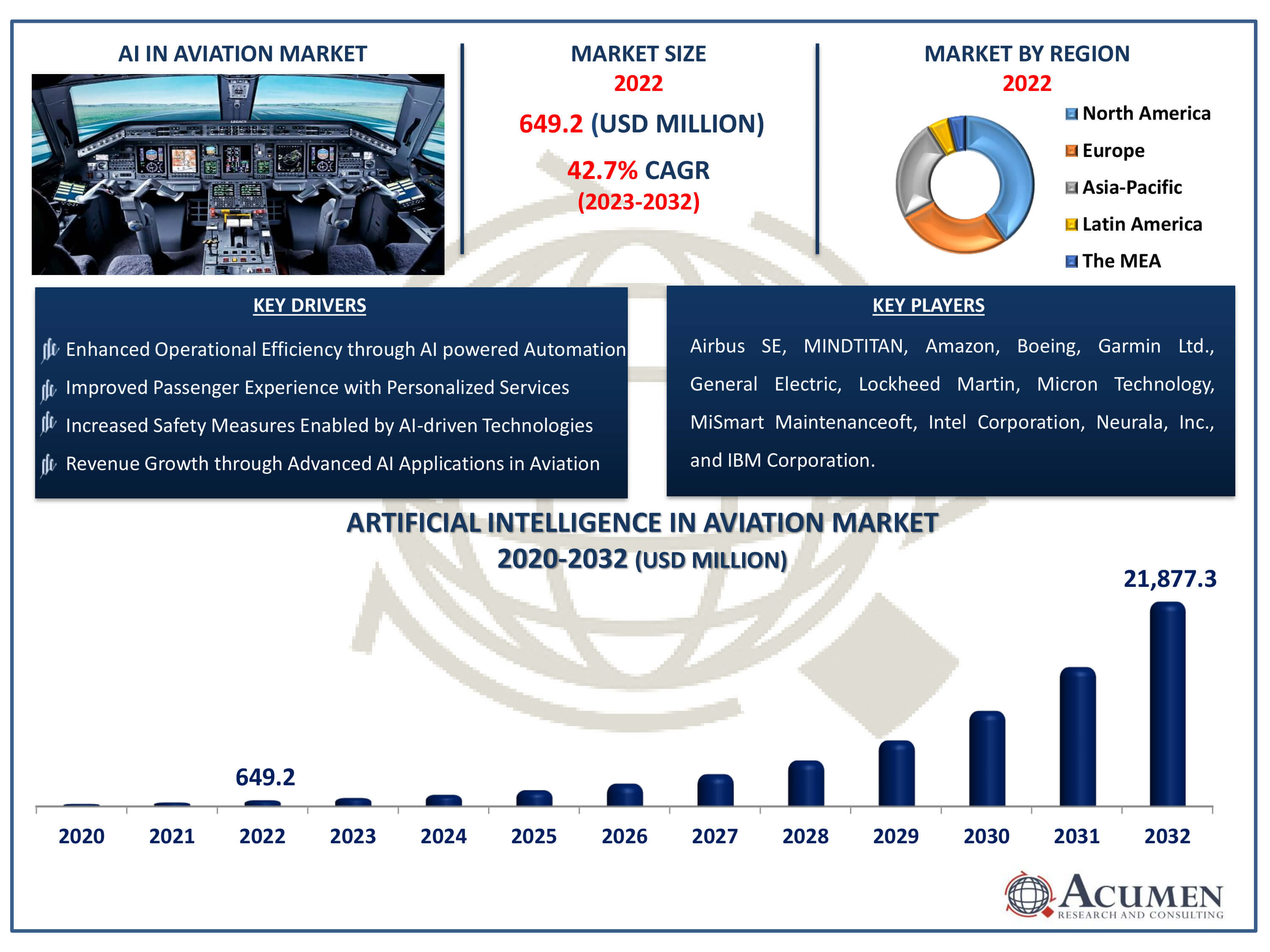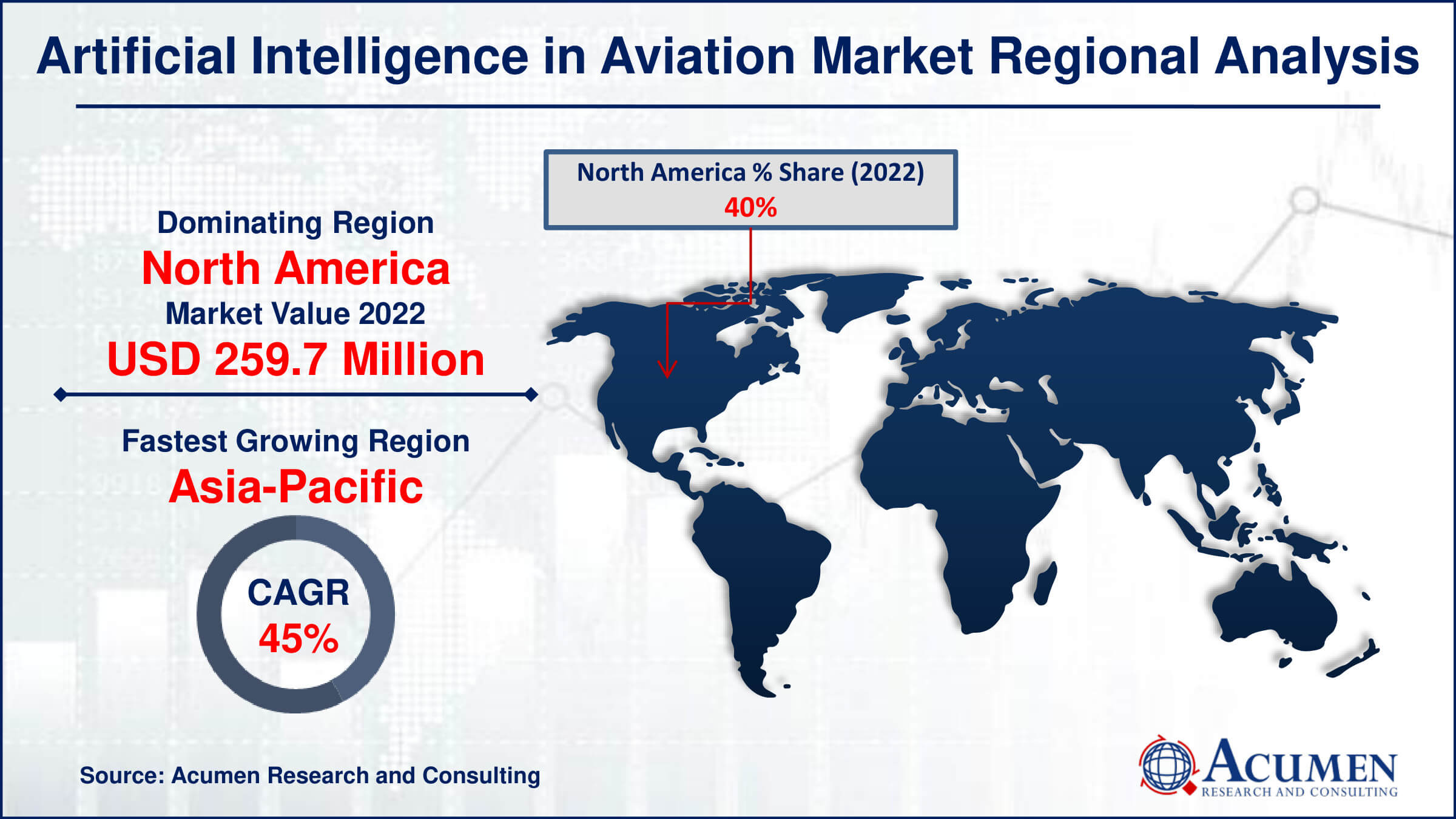Artificial Intelligence in Aviation Market Size - Global Industry, Share, Analysis, Trends and Forecast 2023 - 2032
Published :
Report ID:
Pages :
Format :
Artificial Intelligence in Aviation Market Size - Global Industry, Share, Analysis, Trends and Forecast 2023 - 2032
Report Coverage
- Industry Dynamics
- Market Size and Forecast Data
- Segment Analysis
- Competitive Landscape
- Regional Analysis with a Niche Focus on Country-Level Data
- High Level Analysis - Porter's, PESTEL, Value Chain, etc.
- Company Profiles of Key Players
- Option to Customize the Report As Per Your Specific Need
Request Sample Report
The Artificial Intelligence in Aviation Market Size accounted for USD 649.2 Million in 2022 and is estimated to achieve a market size of USD 21,877.3 Million by 2032 growing at a CAGR of 42.7% from 2023 to 2032.
Artificial Intelligence in Aviation Market Highlights
- Global artificial intelligence in aviation market revenue is poised to garner USD 21,877.3 million by 2032 with a CAGR of 42.7% from 2023 to 2032
- North America artificial intelligence in aviation market value occupied around USD 259.7 million in 2022
- Asia-Pacific artificial intelligence in aviation market growth will record a CAGR of more than 45% from 2023 to 2032
- Among technology, the machine learning sub-segment generated revenue more than USD 207.7 million in 2022
- Based on offering, the software sub-segment generated around 58% share in 2022
- Development of AI-driven solutions for maintenance and repairs is a popular artificial intelligence in aviation market trend that fuels the industry demand

As artificial intelligence (AI) continues to evolve, companies are implementing tremendous changes in their respective fields. The majority of tech giants are investing in AI technology to enhance their products and services, aiming to serve customers in more advanced ways. Over the past decade, world-leading airlines have been exploring how artificial intelligence can help improve operational efficacy, provide passengers with a more personalized travel experience, and ultimately boost revenue generation. Moreover, many leading airlines use AI and machine learning to increase workload speed and safety, enabling the adoption of more complex technologies such as autonomous vision-based navigation and data ecosystems.
Global Artificial Intelligence In Aviation Market Dynamics
Market Drivers
- Enhanced operational efficiency through AI-powered automation
- Improved passenger experience with personalized services
- Increased safety measures enabled by AI-driven technologies
- Revenue growth through advanced AI applications in aviation
Market Restraints
- Regulatory challenges and compliance issues
- High initial implementation costs
- Resistance to adoption due to workforce concerns
Market Opportunities
- Expansion of AI applications in air traffic management
- Collaboration with technology partners for innovations
- Potential for cost reductions with long-term AI integration
Artificial Intelligence In Aviation Market Report Coverage
| Market | Artificial Intelligence (AI) in Aviation Market |
| Artificial Intelligence (AI) in Aviation Market Size 2022 | USD 649.2 Million |
| Artificial Intelligence (AI) in Aviation Market Forecast 2032 | USD 21,877.3 Million |
| Artificial Intelligence (AI) in Aviation Market CAGR During 2023 - 2032 | 42.7% |
| Artificial Intelligence (AI) in Aviation Market Analysis Period | 2020 - 2032 |
| Artificial Intelligence (AI) in Aviation Market Base Year |
2022 |
| Artificial Intelligence (AI) in Aviation Market Forecast Data | 2023 - 2032 |
| Segments Covered | By Offering, By Technology, By Application, And By Geography |
| Regional Scope | North America, Europe, Asia Pacific, Latin America, and Middle East & Africa |
| Key Companies Profiled | Airbus SE, Amazon, Boeing, Garmin Ltd., General Electric, IBM Corporation, Intel Corporation, Lockheed Martin, Micron Technology, MiSmart Maintenanceoft, MINDTITAN, Neurala, Inc. NVIDIA Corporation, Samsung Electronics, TAV Technologies, Thales Group, and Xilinx |
| Report Coverage |
Market Trends, Drivers, Restraints, Competitive Analysis, Player Profiling, Covid-19 Analysis, Regulation Analysis |
Artificial Intelligence In Aviation Market Insights
AI’s ability to process vast amounts of data and streamline tasks and procedures at airport facilities propels the global artificial intelligence (AI) in the aviation industry. AI has also helped humans make real-time decisions in threat-like situations. This aspect of AI will assist pilots in making quick decisions in critical scenarios and potentially save hundreds of lives. AI requires less intervention than humans and performs most crucial tasks autonomously, reducing staff dependence on critical responsibilities and consequently decreasing the number of high-paying jobs. The implementation of AI is also driven by its cost-effectiveness and efficient task management. AI is considered the most efficient technology for operational efficiency and time management. AI technology aids airport authorities in ticket management, flight operations, handling delays, weather forecasting, customer service, and staff management.
In addition, the growing adoption of big data in the aviation industry is likely to boost the demand for AI in the aerospace sector. Big data in the aviation sector is used to simplify the ticket purchasing process, baggage screening, and security checks. Automating these procedures will eventually help travelers and airport staff seamlessly carries out security checks. However, factors such as the lack of AI experts in the aviation industry, system malfunctions, and security concerns may hamper the growth of the AI in aviation market. Prominent airlines are increasing their capital investment in AI to boost their revenue streams, creating numerous growth opportunities for the market in the coming years. Furthermore, an increase in fuel efficiency and the growing demand for cloud-based services in the aviation sector are also expected to fuel market growth during the artificial intelligence in aviation industry forecast period.
COVID-19 Impact Analysis on the Artificial Intelligence AI in Aviation Market
The Covid-19 pandemic forced countries to curb air travel across the world, with most international flights grounded in 2020. Consequently, the industry witnessed a significant drop in revenues, impacting the adoption of AI in the aviation sector. However, with the reopening of lockdowns and the withdrawal of travel restrictions, global air travel is once again increasing. As a result, the demand is likely to pick up in the artificial intelligence in aviation market forecast years.
Artificial Intelligence in Aviation Market Segmentation
The worldwide artificial intelligence in aviation market is split based on offering, technology, application, and geography.
AI in Aviation Market By Offerings
- Hardware
- Software
- Services
Within the offerings segment, the market delineates into three key categories hardware, software, and services. Notably, in 2022, software offerings emerged as the primary contributor, commanding the highest market share. This prominence is a direct result of significant advancements in AI software, specifically tailored for critical applications such as flight operations, surveillance, and airport management. The continuous evolution of AI algorithms has ushered in a new era for the aviation industry, enhancing operational efficiency, bolstering security measures, and optimizing overall airport functionalities. This surge in software dominance is expected to persist, fostering ongoing innovation and technological breakthroughs, as the industry embraces the transformative capabilities of artificial intelligence.
AI in Aviation Market By Technologies
- Machine Learning
- Natural Language Processing
- Context Awareness Computing
- Computer Vision
- Others
According to the artificial intelligenve in aviation industry analysis, machine learning stood out by occupying the largest market share in 2022. This dominance can be attributed to machine learning's remarkable capability to handle previously insurmountable calculations and its efficiency in collecting and managing vast amounts of big data. The technology's adaptability and learning capabilities have significantly contributed to its widespread adoption in the aviation industry, enabling more accurate predictions, improved decision-making processes, and enhanced overall operational performance. As the aviation sector continues to embrace the transformative potential of machine learning, its pivotal role is expected to persist, driving further advancements and innovations in the years ahead.
AI in Aviation Market By Applications
- Virtual Assistants
- Smart Maintenance
- Manufacturing
- Training
- Surveillance
- Flight Operations
- Dynamic Pricing
The application segment is further sub-segmented into virtual assistants, smart maintenance, manufacturing, training, surveillance, flight operations, dynamic pricing, and other applications. Based on this segmentation, virtual assistants occupied the principal share and are likely to continue this trend during the forecast period. Virtual assistants in AI assist airlines in improving productivity and increasing the efficiency of pilots by handling repetitive tasks, such as reading weather forecasts, changing radio channels, and providing position information.
AI in Aviation Market By Regional Outlook
North America
- U.S.
- Canada
Europe
- U.K.
- Germany
- France
- Spain
- Rest of Europe
Asia-Pacific
- India
- Japan
- China
- Australia
- South Korea
- Rest of Asia-Pacific
Latin America
- Brazil
- Mexico
- Rest of Latin America
The Middle East & Africa
- South Africa
- GCC Countries
- Rest of the Middle East & Africa (ME&A)

AI in Aviation Market Regional Analysis
Among all the regions, North America generated the highest revenues in 2022, accounting for 40% of the total market share. This is attributed to the continued leadership of AI in America, supported by the American AI Initiative, enabling the region to maintain a dominant position in the global artificial intelligence sector. The U.S. led the North American AI in aviation market, fueled by increasing investments from leading players in AI technology to manage inventories and enhance operational efficiency. Meanwhile, the Asia-Pacific artificial intelligence (AI) in aviation market is anticipated to witness the fastest CAGR throughout the forecast period. The APAC market is growing due to increased demand for AI technologies, particularly in countries such as China and Japan. Moreover, the rising number of air travelers in the APAC region has prompted leading airlines to adopt AI in their daily operations, enhancing overall efficiency.
AI in Aviation Market Players
Some of the top artificial intelligence in aviation companies offered in our report includes Airbus SE, Amazon, Boeing, Garmin Ltd., General Electric, IBM Corporation, Intel Corporation, Lockheed Martin, Micron Technology, MiSmart Maintenanceoft, MINDTITAN, Neurala, Inc. NVIDIA Corporation, Samsung Electronics, TAV Technologies, Thales Group, and Xilinx.
Frequently Asked Questions
How big is the artificial intelligence in aviation market?
The artificial intelligence in aviation market size of was valued at USD 649.2 million in 2022.
What is the CAGR of the global AI in aviation market from 2023 to 2032?
The CAGR of artificial intelligence in aviation is 42.7% during the analysis period of 2023 to 2032.
Which are the key players in the artificial intelligence in aviation Market?
The key players operating in the global market are including Airbus SE, Amazon, Boeing, Garmin Ltd., General Electric, IBM Corporation, Intel Corporation, Lockheed Martin, Micron Technology, MiSmart Maintenanceoft, MINDTITAN, Neurala, Inc. NVIDIA corporation, Samsung Electronics, TAV Technologies, Thales Group, and Xilinx
Which region dominated the global artificial intelligence in aviation market share?
North America held the dominating position in artificial intelligence in aviation industry during the analysis period of 2023 to 2032.
Which region registered fastest CAGR from 2023 to 2032?
Asia-Pacific region exhibited fastest growing CAGR for market of artificial intelligence in aviation during the analysis period of 2023 to 2032.
What are the current trends and dynamics in the global artificial intelligence in aviation industry?
The current trends and dynamics in the artificial intelligence in aviation industry enhanced operational efficiency through AI-powered automation, improved passenger experience with personalized services, increased safety measures enabled by AI-driven technologies, and revenue growth through advanced AI applications in aviation.
Which offering held the maximum share in 2022?
The software offering held the maximum share of the artificial intelligence in aviation industry.


